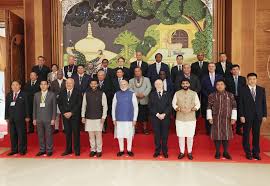Delhi Declaration on Civil Aviation

- 13 Sep 2024
In the News:
The Prime Minister has announced the adoption of the Delhi Declaration on Civil Aviation.
Overview:
The Delhi Declaration was unanimously accepted following the conclusion of the 2nd Asia Pacific Ministerial Conference held in New Delhi. This Declaration provides a thorough framework designed to boost regional cooperation, tackle emerging challenges, and promote sustainable growth within the civil aviation sector across the Asia-Pacific region. The conference also marks the 80th anniversary of the International Civil Aviation Organization (ICAO).
Key Announcements:
- Prime Minister Narendra Modi highlighted significant achievements in Indian aviation, noting that women make up 15% of Indian pilots, a figure that surpasses the global average.
- A proposal for establishing an International Buddhist Circuit was introduced to enhance regional tourism and connectivity.
- India plans to build between 350 and 400 new airports by 2047, aiming to increase its global aviation presence.
- A Pacific Small Island Developing States Liaison Office will be created to help smaller nations manage aviation-related issues.
- The ‘Ek Ped Ma Ke Naam’ campaign was launched, with a goal to plant 80,000 trees in honor of ICAO’s 80 years, emphasizing green aviation and sustainability in future initiatives.
Significance of the Delhi Declaration:
- It marks a significant advancement in enhancing regional cooperation in civil aviation within the rapidly growing Asia-Pacific region.
- The framework tackles crucial issues such as sustainability, green aviation, and safety, which are vital for the current aviation industry.
- Initiatives like the International Buddhist Circuit are in line with broader regional objectives to improve connectivity, tourism, and economic development throughout Asia.
- India aims to assert itself as a major global aviation player with its ambitious plan to construct 350-400 airports by 2047, thereby becoming a key contributor to aviation infrastructure development.
Civil Aviation Sector in India:
- India ranks as the third-largest domestic aviation market globally and is projected to become the third-largest overall by 2025.
- The sector is expanding through significant government programs such as the UDAN Scheme, Pradhan Mantri Gati Shakti Plan, and NCAP 2016.
- With 136 operational airports and plans for an additional 100, the government is focused on modernizing infrastructure, improving regional connectivity, and promoting public-private partnerships for airport development.
International Civil Aviation Organization (ICAO):
- Established in 1947 by the Chicago Convention (1944).
- Headquarters: Montreal, Canada.
- Functions:
- Ensures the safety and efficiency of international air transport.
- Sets standards for aviation safety, security, and environmental performance.
- Encourages regional and international agreements to liberalize aviation markets.
- Promotes cooperation and dialogue among its 193 member states.
- Develops legal frameworks for aviation laws and standards.
